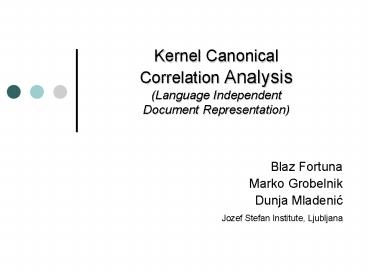Kernel Canonical Correlation Analysis Language Independent Document Representation
1 / 15
Title:
Kernel Canonical Correlation Analysis Language Independent Document Representation
Description:
NOMENCLATURE, COMBINED, COLUMN, GOODS, TARIFF, CLASSIFICATION, CUSTOMS. NOMENCLATURE, COMBINEE, COLONNE, MARCHANDISES, CLASSEMENT, TARIF, TARIFAIRES ... –
Number of Views:216
Avg rating:3.0/5.0
Title: Kernel Canonical Correlation Analysis Language Independent Document Representation
1
Kernel Canonical Correlation Analysis (Language
Independent Document Representation)
- Blaz Fortuna
- Marko Grobelnik
- Dunja Mladenic
- Jozef Stefan Institute, Ljubljana
2
Outline
- What is KCCA intuition and theory
- Preliminary results for AC corpora
- Applications of KCCA
- Related approaches
3
What is KCCA about?
- KCCA enables to represent documents in a
language neutral way - Intuition behind KCCA
- Given a parallel corpus (such as Acquis)
- first, we automatically identify language
independent semantic concepts from text, - then, we re-represent documents with the
identified concepts, - finally, we are able to perform cross language
statistical operations (such as retrieval,
classification, clustering)
4
Slovenian
Slovak
German
English
Czech
French
Hungarian
Spanish
KCCA
Greek
Italian
Language Independent Document Representation
Danish
Finnish
Lithuanian
Swedish
transform
Dutch
New document represented as text in any of the
above languages
New document represented in Language Neutral way
enables cross-lingual retrieval, categorization,
clustering,
5
Input for KCCA
- On input we have set of aligned documents
- For each document we have a version in each
language - Documents are represented as bag-of-words vectors
Bag-of-words space for English language
Bag-of-words space for German language
Pair of aligned documents
6
The Output from KCCA
Semantic dimension
- The goal find pairs of semantic dimensions that
co-appear in documents and their translations
with high correlation - Semantic dimension is a weighted set of words.
- These pairs are pairs of vectors, one from e.g.
English bag-of-words space and one from German
bag-of-words space.
Semantic dimensions pair
7
The Algorithm Theory (1/2)
- Formally the KCCA solves
- max(x,y) Corr(ltx,, , gt, lty,, , gt)
- x, y semantic directions for English and German
- ( , ) is a pair of aligned documents
8
The Algorithm Theory (2/2)
9
Examples of Semantic Dimensions from Acquis
corpus English-French (1/2)
- Most important words from semantic dimensions
automatically generated from 2000 documents
Veterinary, Transport
DIRECTIVE, DECISION, VEHICLES, AGREEMENT, EC,
VETERINARY, PRODUCTS, HEALTH, MEAT DIRECTIVE,
DECISION, VEHICULES, PRESENTE, RESIDUS, ACCORD,
PRODUITS, ANIMAUX, SANITAIRE
Customs
NOMENCLATURE, COMBINED, COLUMN, GOODS, TARIFF,
CLASSIFICATION, CUSTOMS NOMENCLATURE, COMBINEE,
COLONNE, MARCHANDISES, CLASSEMENT, TARIF,
TARIFAIRES
EMBRYOS, ANIMALS, OVA, SEMEN, ANIMAL, CONVENTION,
BOVINE, DECISION, FEEDINGSTUFFS EMBRYONS,
ANIMAUX, OVULES, CONVENTION, SPERME, EQUIDES,
DECISION, BOVINE, ADDITIFS
SUGAR, CONVENTION, ADDITIVES, PIGMEAT, PRICE,
PRICES, FEEDINGSTUFFS, SEED SUCRE, CONVENTION,
PORC, ADDITIFS, PRIX, ALIMENTATION, SEMENCES,
DECISION
EXPORT, LICENCES, LICENCE, REFUND, VEHICLES,
FISHERY, CONVENTION, CERTIFICATE,
ISSUED EXPORTATION, CERTIFICATS, CERTIFICAT,
PECHE, VEHICULES, LAIT, CONVENTION
Veterinary
Agriculture
Export Licences
10
Examples of Semantic Dimensions from Acquis
corpora English-Slovene (2/2)
- Most important words from semantic dimensions
automatically generated from 2000 documents
Agriculture
OLIVE, OIL, AID, SUGAR, PRICE, STATE, MILK,
LICENCES, OR, EXPORT, INTERVENTION OLJA,
OLJCNEGA, POMOCI, SLADKORJA, POMOC, OLJK,
SLADKOR, ALI, DOVOLJENJA, CE
Customs
NOMENCLATURE, COLUMN, COMBINED, GOODS, TARIFF,
CLASSIFICATION, ST, ANNEXED, INVOKED NOMENKLATURO,
STOLPCU, NOMENKLATURE, KOMBINIRANO, KOMBINIRANE,
CARINSKI, BLAGA
QUOTAS, TARIFF, SEED, CUSTOMS, COLUMN, ENERGY,
INVOKED, ATOMIC, QUOTA, OPENING KVOT, TARIFNE,
SEMENA, KVOTE, TARIFNIH, CARINSKI, ATOMSKO,
ENERGIJO, ODPRTJU
DESIGNATIONS, GEOGRAPHICAL, INDICATIONS, EURATOM,
PROTECTED, ECSC, NAMES, ORIGIN OZNACB, EURATOM,
GEOGRAFSKIH, POREKLA, ESPJ, ZASCITENIH, OZNACBE,
IMEN, REGISTER
WINE, WINES, ALCOHOL, DRINKS, DISTILLATION,
POULTRYMEAT, ICEWINE, ANALYSIS VINO, VINA, VIN,
VINSKEM, VINSKEGA, ALKOHOL, NAMIZNEGA,
DESTILACIJO, DESTILACIJE
Energy
Agriculture protection
Wine
11
Applications of KCCA
- Cross-lingual document retrieval retrieved
documents depend only on the meaning of the query
and not its language. - Automatic document categorization only one
classifier is learned and not a separate
classifier for each language - Document clustering documents should be grouped
into clusters based on their content, not on the
language they are written in. - Cross-media information retrieval in the same
way we correlate two languages we can correlate
text to images, text to video, text to sound,
12
Example of cross-lingual information retrieval on
Reuters news corpus using KCCA
Borse Stock Exchange
Borse Stock Exchange
Borse Stock Exchange
Borse Stock Exchange
Borse Stock Exchange
13
Related approaches
- Usual approach for modelling cross language
Information Retrieval is Latent Semantic Indexing
(LSI/SVD) on parallel corpora - measured performance of KCCA is significantly
better then of LSI - Vinokourov et. al, 2002
14
Availability/Scalability
- KCCA is available within Text-Garden text-mining
software environment - available at http//www.textmining.net
- Current version processes up-to 10.000 documents
- Next version (incremental) will be able to
process up-to 100.000 documents
15
Questions?































